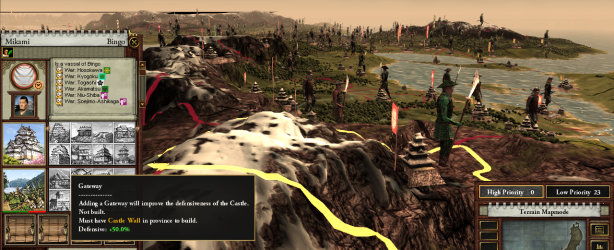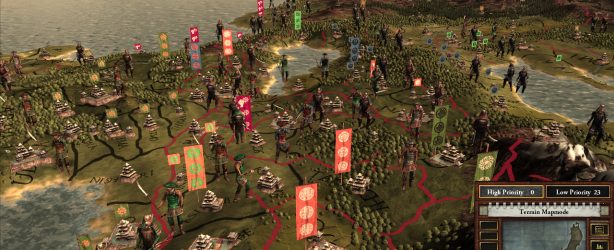
Sengoku Preview
Publisher: Paradox InteractivePlatform: PC
Release Date: 13 September, 2011
Historical strategy looks like a bit of a niche genre once you step away from the Civilization, Age of Empires and Total War series, but niche-or-not it's a genre which produces some fascinating results. Sengoku, Paradox's rival to Shogun: Total War, is one such result, with a game structure that encourages players to create their own narrative within the game.
Charged with the task of becoming Shogun of Japan, you play as the head of one of the many samurai families inhabiting 15th century Japan, competing and scheming with other feudal lords and clan leaders via political manoeuvring and warmongering. The way in which this is carried out will be familiar to anyone that has played any of Paradox's other strategy titles, especially the Crusader Kings series.
The character that you select will dictate the difficulty of the game, as well as how the campaign will play out. The difficulty scale is usefully shown to you before you launch into the game, but it's difficult to comprehend the other effects your character has on the game without playing a few games first - it isn't merely a case of strength handicaps for your armies. There are a many variations to the style of game that you will play, and no two families will provide the exact same experience. Your social standing, the region you control and your immediate neighbours and starting relationships will always be slightly different between choices.
Controlling a family that is the leader of a clan will be relatively straightforward, for example, whereas controlling a vassal family, or one that's considered a lower class, will result in you either having to take control of your clan before moving on, or breaking away and practically building up your social standing from scratch. Instead of starting with the power to decide your course of action, Sengoku essentially asks that you earn the right to that power first.
The way in which this plays out in terms of mechanics is not always obvious. Options to advance your standing seem to be fairly limited at the moment, and we didn't receive much guidance from our clan leaders either, but this challenging style of play definitely adds tremendous replayability to the game, while also hinting at the potential depth often demanded by strategy fans.
Sengoku, like most historical strategy games, initially looks intimidatingly complicated. However, the interface become easier to navigate once you get used to it, and finding the information you require soon becomes a simple task, rather than a convoluted process. Although it takes a little bit of time to get your head around the different relationships between rival families - keeping a notebook next to your keyboard is a must at first - everything is neatly laid out, and getting a quick overview of your current political position is never difficult enough to stop you playing.

MSI MPG Velox 100R Chassis Review
October 14 2021 | 15:04











Want to comment? Please log in.